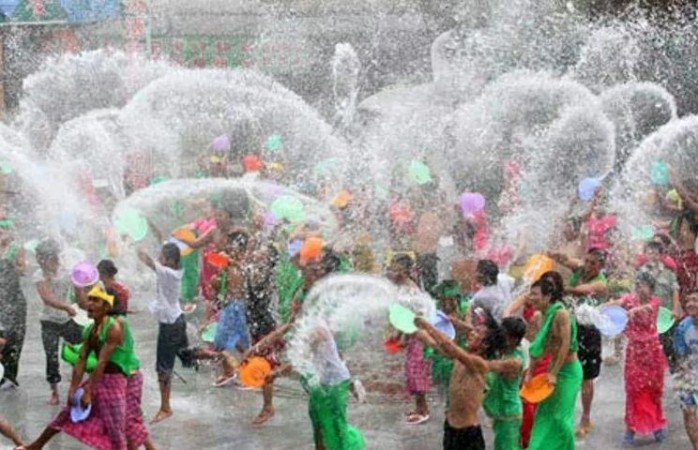
1. Introduction
In Thailand, the Songkran festival is a cherished event that marks the traditional Thai New Year. Celebrated annually from April 13th to 15th, Songkran is known for its exuberant water fights and joyful celebrations throughout the country. This article explores the origins, significance, traditions, and festivities of Songkran, giving you a deeper understanding of Thailand's famous water festival.
2. Origins of Songkran
Songkran has its roots in ancient agricultural traditions and Buddhist customs. It is believed to have originated from the Indian festival of Holi, which symbolizes the triumph of good over evil. Over time, Songkran evolved into a distinct Thai celebration, combining water-related rituals with religious ceremonies and cultural activities.
3. Significance of Songkran
Songkran holds great cultural and spiritual significance for the Thai people. It signifies a fresh start and the washing away of misfortunes from the previous year. The act of splashing water on others during Songkran is seen as a symbol of cleansing, purification, and the sharing of good fortune. It is also a time for family reunions, paying respects to elders, and engaging in acts of merit.
4. Preparations for Songkran
Before Songkran begins, Thai households engage in thorough spring cleaning to welcome the New Year. People also prepare offerings for religious ceremonies at temples, including food, flowers, and other items. Additionally, they purchase water guns, buckets, and traditional clay pots called "Khan" for the water fights that are the hallmark of the festival.
5. Water Fights and Celebrations
The water fights during Songkran are a highlight for both locals and tourists. People take to the streets armed with water guns and containers, engaging in friendly battles and dousing each other with water. The streets become lively with music, dance, and laughter as water fights escalate into full-blown celebrations. Tourists are encouraged to join in the fun and experience the joyful atmosphere firsthand.
6. Traditional Practices during Songkran
Apart from water fights, Songkran is a time when traditional customs are observed. People visit temples to make merit, offering alms to monks and participating in religious rituals. Another important tradition is the pouring of scented water over Buddha statues as a sign of respect and blessings. Additionally, Thai people pay homage to their ancestors by cleaning and decorating their family shrines.
7. Songkran Food and Drinks
Food plays a significant role during Songkran. Traditional dishes such as "Khao Chae" (rice soaked in jasmine-scented water), "Khanom Tom" (sticky rice balls in coconut milk), and "Pad Thai" (stir-fried noodles) are enjoyed during the festival. Locals also prepare refreshing beverages like "Nam Oy" (a sweet herbal drink) and "Cha Yen" (Thai iced tea) to beat the heat of the summer season.
8. Cultural Events and Festivities
Throughout Thailand, various cultural events and festivities take place during Songkran. This includes traditional parades, beauty pageants, and cultural performances showcasing Thai music, dance, and martial arts. One of the most renowned events is the "Miss Songkran" competition, where participants showcase their talents and elegance in celebration of the festival.
9. Tourist Attractions during Songkran
Many popular tourist destinations in Thailand have their own unique celebrations during Songkran. Chiang Mai is particularly famous for its vibrant water festival, with locals and tourists joining together in a massive water fight on the streets. Bangkok's major shopping districts also transform into water battle zones, creating a memorable experience for visitors.
10. Songkran Safety Tips
While Songkran is a festive and joyous occasion, it's important to prioritize safety during the water fights. Here are some essential tips to ensure a safe and enjoyable experience:
Use clean water and avoid throwing dirty or icy water.
Be mindful of others' personal boundaries and avoid targeting individuals who do not wish to participate.
Protect valuables by keeping them in waterproof bags or leaving them in a secure location.
Wear appropriate clothing that can dry quickly and provide protection from the sun.
Be cautious around vehicles and follow traffic rules to prevent accidents.
11. Conclusion
Songkran is a vibrant celebration that captures the essence of Thai culture and traditions. Through water fights, religious rituals, and cultural festivities, the festival brings people together in a spirit of joy, unity, and renewal. By understanding the origins and significance of Songkran, you can fully appreciate this unique and memorable event that showcases Thailand's rich heritage.
The Glass Armonica: Unveiling the Enchanting Sounds of Glass Music
Rupee Charges Ahead: Indian Currency Surges 6 Ps USDollar, Reflecting Investor Confidence
23 Airports Set for Major Upgrades to Boost Traffic and Elevate Travel Experience